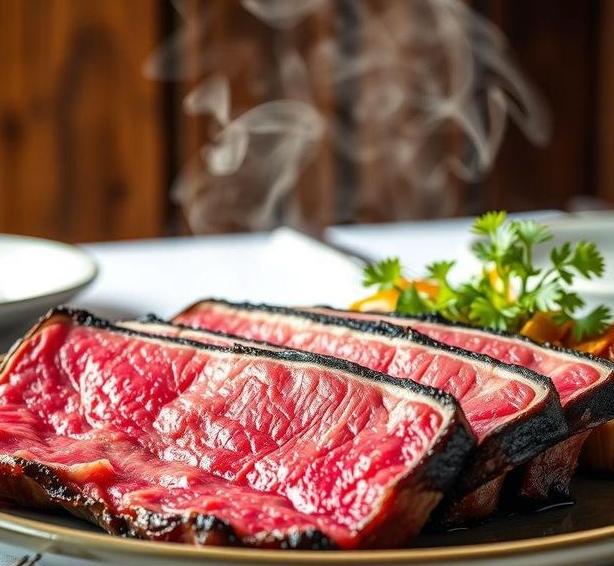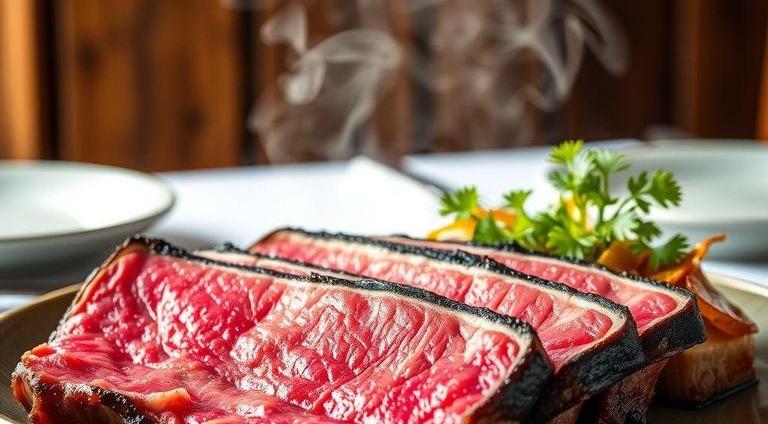Wagyu beef is often regarded as the pinnacle of luxury meat, prized for its exquisite marbling, rich flavor, and tender texture. Whether you’ve been lucky enough to indulge in a perfectly cooked Wagyu steak or are considering buying a high-quality cut for your next meal, it’s essential to understand how to properly handle this delicacy to ensure it remains in top-notch condition. Like all perishable items, Wagyu beef has a limited shelf life and, if not stored or handled correctly, can go bad. But how can you tell if your precious cut of Wagyu is no longer safe to eat? In this guide, we’ll explore everything you need to know, from the shelf life of Wagyu beef to identifying spoilage signs and how to store it for maximum freshness.
Can Wagyu Beef Go Bad?
Yes, Wagyu beef, like all meats, can go bad. While Wagyu is often celebrated for its exceptional flavor and marbling, it is still a type of raw beef, which is susceptible to bacterial growth, spoilage, and deterioration over time. Just because it is a premium cut of meat doesn’t make it immune to the basic rules of food safety. In fact, the higher fat content in Wagyu makes it even more sensitive to improper storage conditions, as fat can turn rancid if left unchecked.
If you’ve ever had Wagyu and noticed how buttery and melt-in-your-mouth it is, you can probably appreciate why you don’t want to ruin that experience by serving spoiled meat. A few key factors influence whether or not your Wagyu beef will go bad, including storage temperature, how long it’s been stored, and whether it’s been exposed to air or moisture.
Shelf Life For Wagyu Beef

The shelf life of Wagyu beef varies depending on how it’s stored and whether it’s fresh, frozen, or vacuum-sealed. Here’s a breakdown of the expected shelf life for different storage conditions:
-
Fresh Wagyu Beef (Refrigerated)
Fresh Wagyu beef, like any other fresh meat, should be consumed within a short window. Typically, you can store it in the refrigerator for 3-5 days from the day of purchase. If you don’t plan to cook it within that time frame, it’s best to freeze it.
-
Frozen Wagyu Beef
Freezing Wagyu beef significantly extends its shelf life. When stored properly in an airtight package or vacuum-sealed bag, frozen Wagyu can last for 6-12 months without significant degradation in flavor and texture. However, it’s best to consume it within the first 6 months for optimal quality.
-
Vacuum-Sealed Wagyu Beef (Refrigerated)
If your Wagyu beef is vacuum-sealed, it can often last a bit longer than non-sealed cuts. It should be stored in the fridge and can last for up to 2 weeks, depending on its freshness when purchased. Always check the expiration date on the packaging to be sure.
Common Signs Of Spoilage
Wagyu beef is a delicate product, and spoilage can happen quickly if it’s not handled with care. Here are some common signs that your Wagyu beef has gone bad:
-
Off Or Sour Smell
Fresh beef should have a slightly metallic or meaty scent, but if it smells sour, rancid, or like ammonia, it’s a clear indication that the beef has spoiled. This is due to bacterial growth breaking down the meat’s proteins and fats.
-
Slimy Or Sticky Texture
As the beef begins to spoil, its surface may become slimy or tacky to the touch. This is a sign of bacterial activity. Fresh Wagyu should have a firm texture, and you should be able to feel the marbling without any sliminess.
-
Discoloration
While Wagyu beef’s marbling can vary in color, fresh cuts should have a rich red or pink hue with streaks of white fat. If you notice any greenish, brown, or grayish discoloration on the meat, this is a sign that spoilage has occurred. However, slight browning on the edges might simply indicate oxidation and doesn’t necessarily mean the meat is spoiled.
-
Dryness Or Freezer Burn
If your Wagyu beef has been stored improperly in the freezer, it may develop freezer burn. This looks like pale, dry patches on the surface of the meat and is caused by dehydration. While freezer burn doesn’t mean the meat is unsafe to eat, it can affect the texture and flavor.
-
Excessive Liquid
If you notice an abnormal amount of liquid in the packaging, particularly if it’s cloudy or murky, this could indicate that the meat has started to break down. While some liquid is normal, an overwhelming amount is a red flag.
How To Store Wagyu Beef?

To maximize the shelf life of your Wagyu beef and preserve its luxurious quality, proper storage is key. Here are some best practices for keeping your Wagyu beef fresh:
-
Refrigeration
Store fresh Wagyu beef in the coldest part of your refrigerator (usually the back). Ensure it’s wrapped securely or in an airtight container to prevent exposure to air, which can cause it to spoil faster. Don’t leave it sitting out at room temperature for more than two hours (or one hour if the temperature exceeds 90°F), as bacteria can grow rapidly in this temperature range.
-
Freezing
If you don’t plan on cooking the Wagyu beef within a few days, freezing it is a great way to extend its shelf life. Before freezing, ensure the meat is vacuum-sealed or wrapped tightly in plastic wrap and then foil to prevent freezer burn. It’s important to label the packaging with the date so you can keep track of how long it’s been stored.
-
Vacuum Sealing
Vacuum-sealing is one of the best ways to preserve both the flavor and texture of Wagyu beef. It prevents air from getting in contact with the meat, reducing oxidation and bacterial growth. If your Wagyu beef comes pre-vacuum-sealed, you can typically store it in the fridge for up to two weeks.
-
Thawing
When you’re ready to cook frozen Wagyu, the best way to thaw it is in the refrigerator overnight. This helps maintain its texture and flavor. Avoid thawing meat at room temperature, as this can allow harmful bacteria to grow.
Expert Tips
-
Don’t Overcrowd The Fridge
If your refrigerator is too packed, it might not be maintaining a consistent cold temperature, which can cause spoilage. Make sure there’s enough space for air to circulate around your meat.
-
Use A Meat Thermometer
When cooking your Wagyu, a meat thermometer is a must. For the perfect steak, aim for an internal temperature of 120°F to 130°F for medium-rare. Wagyu is so tender that cooking it at lower temperatures preserves its melt-in-your-mouth texture.
-
Vacuum Seal Before Freezing
If you have a high-quality cut of Wagyu and want to store it for a longer period, invest in a vacuum sealer. This minimizes the chances of freezer burn and maintains the meat’s fat integrity.
-
Don’t Let It Sit Out
Never let your Wagyu beef sit out for extended periods of time, especially if you’re planning to cook it later. The bacteria growth rate at room temperature is fast, and the more time it spends in the "danger zone" (40°F to 140°F), the more likely it is to spoil.
FAQs
Can Wagyu Beef Go Bad If Left Out At Room Temperature?
Yes, like all types of meat, Wagyu beef can go bad if left out at room temperature for more than 2 hours. Bacteria multiply rapidly at temperatures between 40°F and 140°F, which can lead to foodborne illnesses.
How Can You Tell If Wagyu Beef Has Gone Bad?
You can tell if Wagyu beef has gone bad by checking for a sour smell, slimy texture, discoloration (especially a brownish or grayish color), or a sticky surface. If any of these signs are present, it’s best to discard the beef.
How Long Can Wagyu Beef Stay Fresh In The Fridge?
Wagyu beef can stay fresh in the fridge for 3 to 5 days if properly stored. Ensure it’s wrapped tightly or in an airtight container to minimize exposure to air.
Can You Freeze Wagyu Beef To Extend Its Shelf Life?
Yes, Wagyu beef can be frozen to extend its shelf life. If frozen properly in plastic wrap or vacuum-sealed bags, it can last up to 6 to 12 months in the freezer without significant loss in quality.
Does Wagyu Beef Spoil Faster Than Regular Beef?
No, Wagyu beef does not spoil faster than regular beef if stored properly. However, due to its higher fat content, it may develop rancid flavors faster if not stored correctly.
Can You Eat Wagyu Beef Past Its Sell-by Date?
It’s not recommended to eat Wagyu beef past its sell-by date, as it may no longer be safe to consume. Always check for signs of spoilage like odor, color changes, or texture issues before deciding to eat it.
What’s The Best Way To Store Wagyu Beef To Prevent It From Going Bad?
The best way to store Wagyu beef is in the coldest part of your fridge, tightly wrapped in plastic or butcher paper, or vacuum-sealed. If you plan to store it for a longer time, freezing is recommended.
Does Wagyu Beef Need To Be Consumed Sooner Than Other Beef Cuts?
Wagyu beef doesn’t need to be consumed sooner than other beef cuts, but due to its marbling and fat content, it’s essential to store it properly to prevent spoilage and retain its flavor and texture.
Can Wagyu Beef Develop Freezer Burn If Stored For Too Long?
Yes, Wagyu beef can develop freezer burn if stored in the freezer for too long or improperly sealed. Freezer burn occurs when air reaches the surface of the meat, causing it to dry out and lose quality.
What Temperature Should Wagyu Beef Be Stored At To Avoid Spoilage?
Wagyu beef should be stored at a temperature of 32°F (0°C) or lower in the fridge or freezer. If it is left out at temperatures above 40°F (4°C) for extended periods, it can spoil quickly.